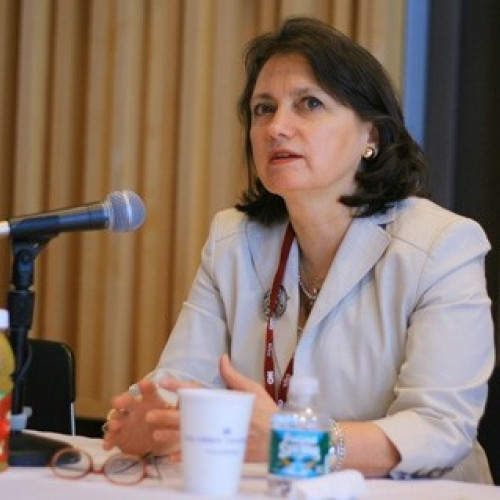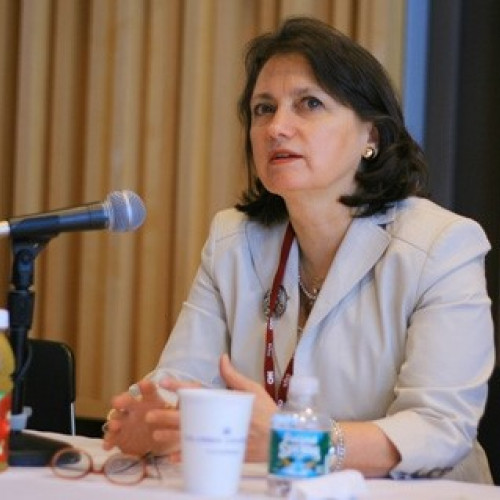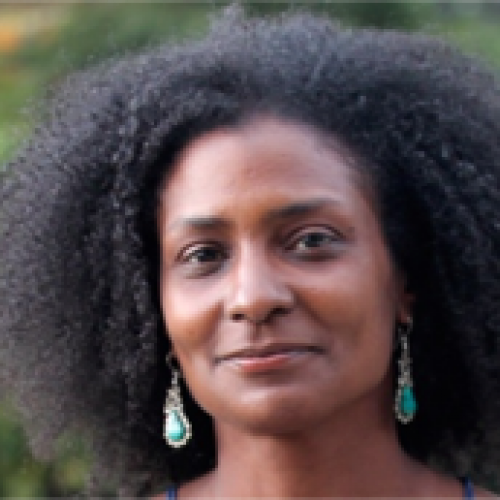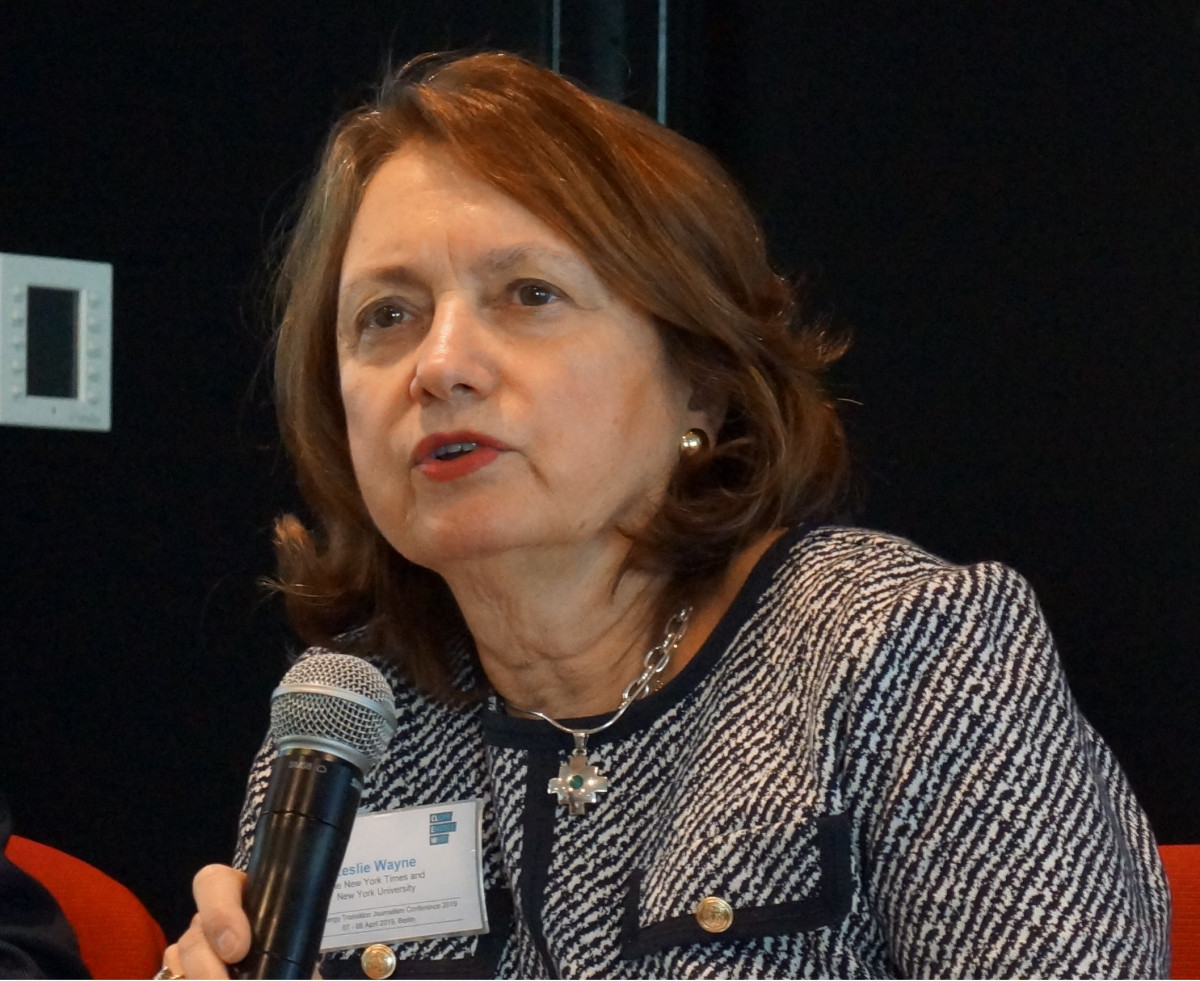Leslie Wayne: “Dumb questions can end up being the smartest of all.”
Rose-Anne Clermont: Leslie, you mentioned during the GETJO19 conference that journalists who want to cover business and the energy transition need to have the right set of skills. What could a journalist do to acquire these skills, and prove to an editor that she/he is capable of making a “transition” into covering new beats?
Leslie Wayne: I think that some of the skills are the skills of any good journalist – curiosity, a willingness to dig, an ability to see stories where other people may not, fearlessness in asking questions, and an ability to follow facts wherever they lead. These are the innate skills of a good journalist. Even more, having additional technical skills is becoming increasingly important. I feel that understanding some business basics can be of immense help to an environmental reporter. These would include understanding some fundamentals of finance – how to read a balance sheet and an income statement, how to understand how companies and deals are financed, how to follow the trail of money behind either fossil fuel projects or green energy projects. Being comfortable with numbers is important, especially when looking at data. And, as always, the ability to ask “dumb” questions on things a reporter doesn’t understand. These often end up being the smartest questions of all.
Editors always seem to be looking for reporters with good story ideas. Sometimes reporters have to invest some time and energy in researching a story before presenting it to an editor. Having some of these skills might enable a reporter to propose smarter, more sophisticated and compelling stories. Another way of telling a story is visually. Increasingly, reporters are learning how to tell stories with graphics rather than words, especially for an online audience. An ability to tell a story visually instead of with words – or in combination – is another skill that climate reporters might want to think about.
One other really important skill is the ability to take a complicated subjects – like climate change or energy transition – and explain it in terms that the average reader can understand while still being true to the complexity of the subject. That takes time and experience and an ability to understand your topic thoroughly so that it can be explained well. The stories that seem to have the biggest impact are those that are well told and are easy for the reader to absorb.
Do you recommend that journalists from different beats collaborate in order to cover all areas of expertise in a complicated climate or energy-related business story?
Absolutely. At The New York Times, reporters covering climate change are posted in a variety of departments – science, health, business, politics and the national desk – and they collaborate on many stories. For instance, a reporter from Washington might team up with a science reporter to cover a story that has both policy and science dimensions. Or a business reporter might team up with someone from the health section. Each person brings their own expertise to the story, while still operating under the umbrella of the climate team. In these cases, two plus two equals five.

The energy transition story is big, important and sprawling. It crosses borders and topics. It has human, financial, political and environmental dimensions.
I think that reporters, no matter where they work, could start looking out for colleagues in other departments and produce work that has much more depth and breadth than if they were operating alone. The energy transition story is big, important and sprawling. It crosses borders and topics. It has human, financial, political and environmental dimensions. Cross-beat reporting is needed to tackle this important and complicated subject.
Here is a link to the NYT climate desk stories. You will see that the stories really do come from all desks and all places in the paper.
Apart from amazing pitching skills, how can a journalist best convince an editor that a climate story does not have to stay in the science section, which is generally read less than, say, the political section?
If a story has more of a business angle, or a political angle or an angle that goes beyond science, then the journalist would have a more convincing case that a story might be located somewhere other than the science section. These are big important business stories – millions and billions of dollars are involved in energy transition. So, the business section is a logical place. Then, there is the issue of climate migration and how that plays into the current issue of immigration all over the world. That could go into a political, national or international section. Again, referring to The New York Times’ climate stories, you will see that there are a lot of stories with multiple bylines, placed in a variety of sections around the paper.
https://www.nytimes.com/section/climate
Increasingly, research for climate stories (in The Guardian, for example) is partially sponsored by NGOs or foundations. Do you think this is the only approach to getting additional funding, particularly for investigative stories?
I realise that money is tight for news organisations and for freelance journalists. Still, news organisations have to be extremely careful in taking money from outside sources. An NGO that is involved in the climate change world and is an advocate would not be an organisation that a media company or a journalist should team up with. It would be just as much of a conflict for a journalist to be funded by a fossil fuel company as by a climate-advocacy NGO.

Getting money from climate advocacy NGOs is just as much a conflict of interest as accepting money from a fossil fuel company.
I think funding from NGOs that fund journalism projects not related to specific advocacy – for instance, the Knight Foundation in the US, or the International Center for Journalists or from some journalism schools – would be acceptable. These organisations have no advocacy other than wanting to support good journalism of all sorts and offer grants for good stories. Also, often times news organisations would team up with other news organisations. For instance, a nonprofit group like Inside Climate News might be a logical organisation for a mainstream media company to team up with on larger projects.
In general, I think climate stories that are funded by foundations that have no climate advocacy agenda and are only interested in funding good journalism would be acceptable partners. Getting money from climate advocacy NGOs is just as much a conflict of interest as accepting money from a fossil fuel company.
How can a journalist remain critical when covering business and the energy transition? What kinds of situations should a journalist steer clear of?”
One New York Times reporter has a policy not to do stories about a single green energy company. He gets pitched all the time about new “magic bullet” technologies and maintains a healthy scepticism about these pitches. I think it is important for journalists to be as sceptical of green energy pitches and promises as they would from fossil fuel companies.


